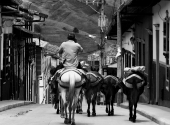Songs Written with a Machete #6: Sing or I’ll Blow Your Head Off!
I spent eighteen months of my three-year South American adventure in the Colombian wilderness, in a mountain village near the infamous Medellín. As a bluesman, I was impressed by local songs, whose lyrics would wake up even Oblomov from his lethargy. I decided to translate the juiciest pieces and bring them to you in the series Songs Written with a Machete.
It was New Year's Eve 1981 and Hector Lavoe and his fellow musicians arrived in Medellín. At that time, he was the most famous salsa singer, who we could safely and without any exaggeration call the uncrowned king of Hispanic music. Pablo Escobar was throwing a party – and when he threw a party, he threw a luxurious one! The drug baron, who earned millions of dollars a day, could afford to pay one of the most expensive artists with an entire ensemble.
But there was a catch. Pablo Escobar was an erratic maniac who could easily shift from friendly euphoria into dark violence, pathological egoism and devastating ruthlessness. And so Hector Lavoe's supposedly three-hour performance turned into a seven-hour ordeal, with the most famous Puerto Rican having to sing his most notorious hit "El cantante" (translated as "The Singer") over and over again.
When the iconic song was about to be sung for the tenth consecutive time at Escobar's request, he did something Escobar didn't forgive. He said loudly, "No!" and told him to go fuck himself. Then the hand of the cruellest narcoterrorist drew his pistol and the unfortunate Lavoe found himself staring into the gun barrel. After the dramatically tense situation, the drunken Escobar calmed down, ordered his goons to strip the entire band, including the singer, down to their briefs and lock them in the bathroom, where they were to be held until they came to their senses, so to speak.
Lavoe gathered the last of his courage in the toilet, broke the ventilation window and helped all the musicians escape from Escobar's party, which had taken such a dangerous turn. A shocked taxi driver pulled up in front of the group of half-naked men long after midnight near Medellín's upmarket district of Poblado, and only after Lavoe sang his hit did he believe him and drove him and his musicians to safety. The next day, Escobar sobered up, realising a possible international scandal, and sent Lavoe a hefty reward, including some hush money and suitcases full of new clothes.
Since then, Lavoe avoided Medellín like the plague, preferring to perform in his native United States, where he died in 1993 – ironically, the same year as Pablo Escobar. However, unlike Medellín's godfather, he didn't die in a shootout with the police, but of AIDS. He was only forty-seven years old.
El cantante
I am the singer
you have come to hear today,
I'm going to offer you
the best of my repertoire.
I sing to life
Of laughter and sorrow,
of bad times
and good things
You came to have fun
and you paid at the door,
there's no time for sadness,
come on singer, start.
They always stop me in the street,
a lot of people say:
Hey Hector, ha! you have a great life,
always with women and parties.
And nobody asks
if I suffer, if I cry,
if I have a sorrow
that hurts very deeply.
I'm the singer,
I am here to sing
and the public pays
to be able to listen to me.
I am the singer,
very popular wherever I go,
but when the show's over
I'm just another human being.
And I go on with my life
with laughter and sorrow,
with bitter times
and with good things.
I'm the singer
and my business is to sing
and to those who follow me,
I'm going to offer my song.
I am better than yesterday, just compare it, you carping critics.
If you don't love me when I live, don't cry for me when I die.
I sing to you of life, forget your sorrows and your pains,
dance if you want to dance, sing if you want to sing.
I'm the singer, let's go celebrate,
I don't want sadness, my thing is to sing, to sing!
It's not as easy to sing, as some people think.
Life has given me everything, heartbreaks and hopes.
Cheers to my rival, I say they also deserve credit.
I make the world tremble, get ready, dancers,
When I sing, I forget the pains and the sorrows.
Listen carefully to that guy, it says it all, gentlemen!
[...]
This most famous salsa song from 1978 has outlived its author and is still one of the iconic gems of Latin America.
If you have found an error or typo in the article, please let us know by e-mail info@insounder.org.



